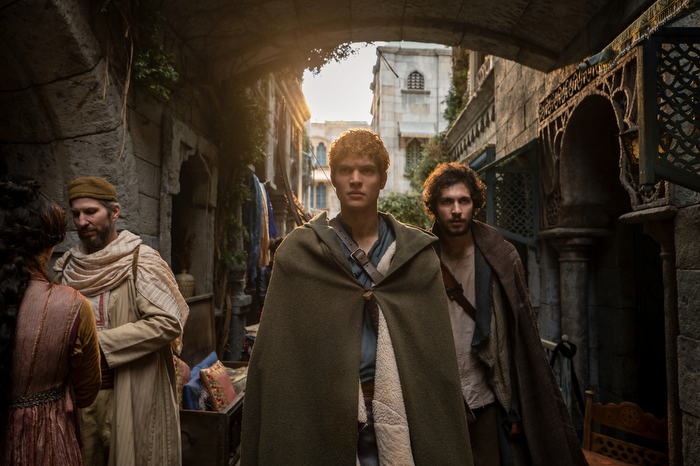
Enlarge / Rand and Mat finally make it to Tar Valon.
Andrew Cunningham and Lee Hutchinson have spent decades of their lives with Robert Jordan and Brandon Sanderson's Wheel of Time books, and they're bringing that knowledge to bear as they recap each episode of Amazon's new WoT TV series. These recaps won't cover every element of every episode, but they will contain major spoilers for the show and the book series. If you want to stay unspoiled and haven't read the books, these recaps aren't for you.
New episodes of The Wheel of Time will be posted to Amazon Prime subscribers every Friday.
And after that, we get a big, month-long time skip—and then we’re off to Tar Valon!
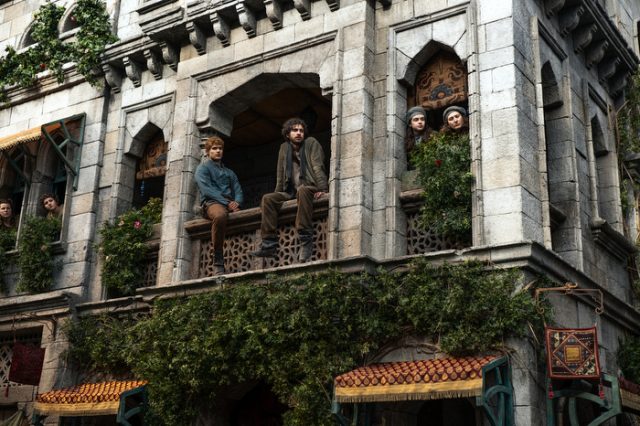
Ahh, Minas Tirith Tar Valon! (credit: Amazon Studios)
I promise not to make this kind of pooh-poohing a habit, but the show’s Tar Valon doesn’t really match my headcanon appearance. I see no flowing Ogier masonry, no fluted bridges and connecting towers. The up-close shots of the city streets with their dirty white stonework look like they were borrowed from Minas Tirith in Return of the King. And the White Tower itself is an artless stump of half-melted wax—like if you put the book’s version of the White Tower in a microwave and let it just kind of... collapse on itself. If there’s an architectural antecedent to the design we see on screen, it’d be something like Angkor Wat—except without the grace or beauty. Sorry, Amazon, but the Shining City is a swing and a miss for me.
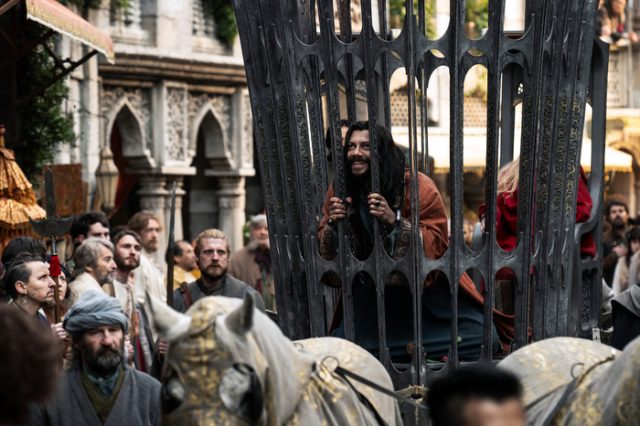
Poor Logain. He's maybe looking a little, how do you say, mad. (credit: Amazon Studios)
We have talked a few times about the differences in how the One Power is depicted in this show, and I came away from this episode mulling something that is kind of separate from that but also kind of not? Everything we see about Warder culture on this show is modeling an emotionally open and vulnerable version of masculinity that is really sticking out to me as a reader of the books. Most (if not all) of these men spend the books talking about duty and self-sacrifice and how they're all too DANGEROUS to have friends or lovers. No one ever takes their childhood friend by the shoulder and just asks how they're holding up. Book-Lan gives Nynaeve the Pee-Wee Herman "I'm a loner, Dottie, a rebel" speech pretty much verbatim.
But in the show we are regularly seeing groups of men having emotionally mature conversations, and crying, and just being there for each other? We briefly noted it last week, in that moment where Rand checks in on Mat because he's worried about him. I am sure that this is going to piss off some element of the fandom, anyone who believes this affected machismo is something to emulate and not (as the books ultimately depict it!!) a character flaw. But I've found it strikingly refreshing.
But I love the bits of Warder culture we get to see—both the campfire camaraderie and also how they behave back at the Tower. They’re a proud group with their own traditions and their own place among the Aes Sedai. The books never give us much of a peek into what Warders are like behind closed doors, surrounded by safe company, and the humanity on display when Lan and Stepin are talking about what comes next for Stepin—and what “adventures” he might have if Alanna of the Green Ajah bonds him—is my favorite part of the episode. All the more so because of what happens next.
Though, speaking of favorite things—we gotta talk about Loial. Are you ready to talk about Loial? Because Loial shows up!
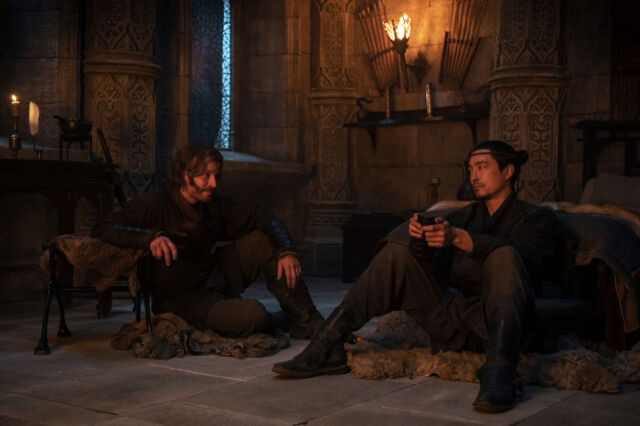
Warders share quality bro time. (credit: Amazon Studios)
But speaking of things that this episode does not get to spend enough time with! Loial, son of Arent, son of Halan, played by Hammed Animashaun. I love him. I want more of him. But this episode does have to breeze past him pretty quickly, which is a little weird for what I believe is our first indication anywhere that friendly non-human species inhabit this world.
Sidebar: What do Ogier look like in your headcanon? In my head Loial looks like Sully from Monsters Inc, for some reason. But I think the show's depiction of him as a sort of large exceptionally hairy man with exaggerated features and a downward-modulated voice isn't bad (think a larger, more huggable version of Worf from Star Trek and you're pretty much there).
Having Rand say that is also a great way to surface the idea to show viewers that Wheel of Time is set in a world where each past age eventually comes again—time, we are told, is a seven-spoked wheel, and each spoke represents an age. The implication is that the myths and tales about ogres that we know in our own 21st-century modern age might have sprung from the Ogier of Rand’s time. (And there are reciprocal myths mentioned in the books, like Thom Merrilin’s tale of the giants Mosk and Merk fighting with spears of fire, or Egwene’s talk of the hero Lenn, who flew to the Moon in the belly of an eagle made of fire).
Showrunner Rafe Judkins has said that Animashuan’s appearance as Loial is mostly practical effects and make-up, which is done both to control VFX costs and also to give Animashuan and the other actors the ability to inhabit the roles and act off of each other in a more natural way. (One only has to read Ewan McGregor’s laments about extensive green-screen acting to see the value in sticking with physical, practical effects whenever possible.)
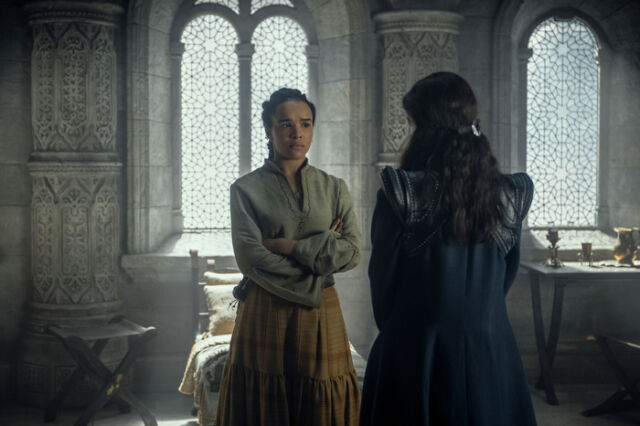
"Yer a wizard, Nynaeve!" (credit: Amazon Studios)
Speaking of things to catch—there was another Padan Fain whistle in this episode. Did you catch it?
OK, all of our characters have converged or are converging on Tar Valon here, anyone you want to mention in particular? Rand and Mat mostly cool their heels in a hotel while Mat succumbs to KNIFE MADNESS, which the show characters still suspect is channeling madness.
Though at this point we might need to shift gears a bit, because we gotta talk about poor Perrin and Egwene and their little session at the hands of Child Valda.
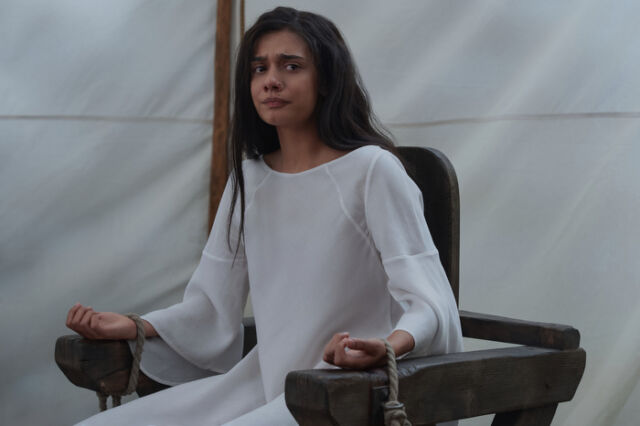
Egwene must make a choice: she dies, or Perrin dies. Fortunately, she chooses the secret third option: "Wolves eat everyone." (credit: Amazon Studios)
I feel like at this point it’s pretty clear we’re not going to see Elyas Machera for a while, if ever. Show-watchers who haven’t read the books probably won’t miss him, but Elyas is a fan favorite. His role in the books is to explain stuff to Perrin (and us!) about why Perrin is suddenly going all Teen Wolf, but so far the show is doing a perfectly fine job without him. If I were a bettin’ man, I’d say we’ll likely hear Elyas’ exposition dumps from Moiraine when the time comes—it feels like having her Know Things about Perrin’s wolfishness would be an appropriate alternative to introducing another dialogue-heavy character in the back half of the season. We’re already getting Loial, after all, and of the two, Loial is more important.
about Perrin’s wolfishness would be an appropriate alternative to introducing another dialogue-heavy character in the back half of the season. We’re already getting Loial, after all, and of the two, Loial is more important.
This episode has also done nothing to disabuse me of my Liandrin-as-composite-character-who-includes-Elaida theory, since we have totally skipped over Caemlyn, and we get clear confirmation in this episode that Liandrin is a political operator who has been gathering support in the White Tower. But it's saying something that I'm already so uncertain about where the show is going to go, despite having read all the books multiple times, because removing even a minor character from the series' teetering Jenga tower of named characters ripples out and has huge story implications.
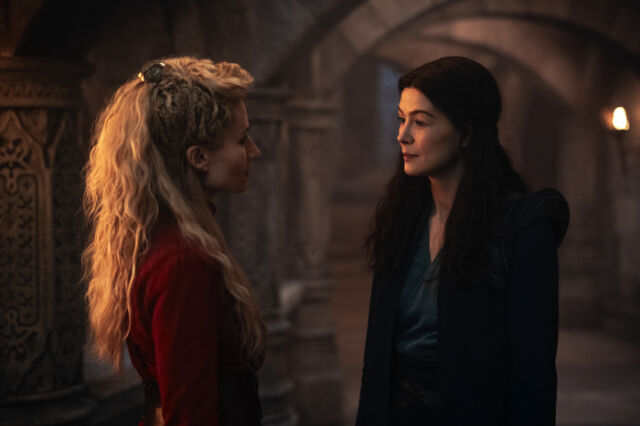
Plots are afoot at the White Tower. (credit: Amazon Studios)
The episode is bookended by funerals—we start by burying the Aes Sedai and Warders who were killed by Logain's followers, and we end with a funeral ritual for Stepin in the White Tower.
(Two other show-inventions on this note that I liked, as we wrap up: how Kerene's Great Serpent ring is melted down at the White Tower, presumably into the same pool of molten material used to make new rings for new Aes Sedai—I don't believe this is mentioned in the main books at all, but it fits well with the series' cyclical motifs. Also Álvaro Morte's Logain is communicating volumes with his blank, post-gentling stare).
The funeral ritual with Lan’s howls of grief was very powerful—and having Moiraine (and Alanna, to a lesser degree) join in is yet another signal to viewers just how strong and deep the Aes Sedai/Warder bond is. It’s a thing beyond marriage, beyond family—it’s a commingling of personhood, almost. Moiraine gets emotional when Lan drinks, because she can feel it through the bond. And when he grieves, that too leaks through back to Moiraine.
I dig it. It works for me.
(credit: WoT Wiki)
No comments:
Post a Comment